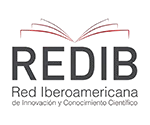Políticas sociales para promover la actividad innovadora de las empresas ucranianas en tiempos de guerra
Resumen
Se formula la definición del autor de la actividad de innovación, se revela la esencia del potencial de innovación y sus componentes: intelectual, personal, tecnológico, de investigación, financiero, infraestructural, organizativo y de gestión. Se describen los problemas del desarrollo innovador de la Ucrania moderna en condiciones de guerra que impiden el funcionamiento de la economía del país. Se concluye que para el curso estratégico del desarrollo socioeconómico de Ucrania es importante tener en cuenta la experiencia mundial de la metodología de formación de las áreas prioritarias nacionales de la ciencia y la tecnología, el desarrollo innovador de las empresas. La atención se centra en la viabilidad de utilizar en el proceso de innovación los logros de la industria de TI como la transparencia de la gestión de la información, la reducción de costes, los sistemas de gestión de las relaciones con los clientes, etc. Según los resultados del estudio, se han propuesto medidas para crear un entorno de orientación social para el desarrollo de las entidades económicas y fortalecer su competitividad a nivel nacional e internacional, el potencial del movimiento de inicio para garantizar la renovación tecnológica y el crecimiento económico del país se ha comprobado.
Descargas
Citas
Bielialov, T., Shtuler, I., Tereshchenko, D., Horiachova, N., Pashniuk, L. (2023). Prospects for the development of investment and innovation activity in Ukraine. Political perspectives for the development of investment and innovation activity in Ukraine. Cuestiones Políticas, Vol. 41(76), 116–135. URL: https://doi.org/10.46398/cuestpol.4176.06 (date of access: 10.01.2024).
Bodnaryuk, M. (2023). Theoretical foundations of the innovative potential of domestic enterprises. Innovative processes and their impact on the efficiency of the enterprise. Kyiv. Part 1, 3–7.
Boyko, I. (2018). Innovative potential of the enterprise: essence and structure. URL: https://conf.ztu.edu.ua/wpcontent/uploads/2018/12/20.pdf (date of access: 10.01.2024).
Boyko-Boychuk L. (2009). The concept of “social innovation”: types of definitions, examples of application. Science and innovation.Vol. 5, No. 3, 94–99.
Dligach, A. (2022). Post-war economic policy will require a complete change of approaches. URL: https://gmk.center/ua/opinion/povoienna-ekonomichna-politika- potrebuvatime-povnoi-zmini-pidhodiv/ (date of access: 10.01.2024).
EBA. (2023). The war did not force business to abandon the principles of sustainable development. URL: https://eba.com.ua/vijna-ne-zmusyla-biznes-vidmovytys-vid-pryntsypiv-stalogo-rozvytku-doslidzhennya-eva (date of access: 10.01.2024).
Economic Code of Ukraine. (2003). Law of Ukraine. No. 436-IV. URL: https://zakon.rada.gov.ua/laws/show/436-15#Text (date of access: 10.01.2024).
Economic truth. (2022). Four recovery funds have become operational in Ukraine: what they are and how to help. URL: https://www.epravda.com.ua/news/2022/03/12/683904/ (date of access: 10.01.2024).
Gorbachenko, S. (2021). Peculiarities of the implementation of management innovations by IT business entities. European vector of economic development. Vol. No. 1 (30), 18–24.
Kasych, A., Kanunikova, K. (2016). Innovative activity of Ukrainian enterprises: dynamics, problems and solutions. Investments: Practice and Experience. Vol. 22, 2–24.
Klymash, N. (2023). Innovative development of Ukraine: obstacles and opportunities. Problems and prospects of the development of innovative activity in Ukraine: challenges of wartime: theses add. XIV International business forum (Kyiv, March 23, 2023). Kyiv, 33–35.
Kosovets, H. (2023). Innovative activity in Ukraine: current trends. Problems and prospects of the development of innovative activity in Ukraine: challenges of wartime: theses add. XIV International business forum (Kyiv, March 23, 2023). Kyiv, 35–43.
Kovalyova, A. (2014). Approaches to creating a successful startup: world experience. URL: http://confcontact.com/2014_02_meshko/37_Kovalyova.htm (date of access: 10.01.2024).
Kushnir, N. (2020). Analysis of the efficiency of attracting intellectual investments in Ukraine. Scientific Bulletin of the Uzhhorod National University. No. 30, 102– 105.
Nikitenko, V., Voronkova, V., Oleksenko, R., Filoretova, L., Lanoviuk, L., & Khvist, V. (2023). Perspectives of civilizational political development of world regions in the context of current challenges and opportunities. Cuestiones Políticas. 41(76).
On Innovative Activities. (2002). Law Of Ukraine. No. 380-IV 2002. No. 36. Art. 266. URL: http://zakon3.rada.gov.ua/laws/show/40-15 (date of access: 10.01.2024).
On Investment Activities. Law Of Ukraine. (1991). No. 1561-12. URL: http://zakon.rada.gov.ua (date of access: 10.01.2024).
Poklonskyi, A., Poklonska, O., Klymchuk, M., Slobodianiuk, B., Torlo, O. (2021). Prospects of Ukraine’s foreign economic policy concerning Latin America. Cuestiones Políticas. Vol. 39, No. 70, 179–194.
Raccoon – HealthTech. (2023). World rehabilitation solution for people. URL: https://raccoon.world/about-us (date of access: 10.01.2024).
Sarkanych, M. (2023). Business Survival at War: Mission Possible. Theoretical foundations of the innovative potential of domestic enterprises. Innovative processes and their impact on the efficiency of the enterprise. Kyiv. Part 1, 25–28.
Slastyanikova, A. (2020). The main guidelines for the development of intellectual entrepreneurship. Economic Bulletin of the Dnipro Polytechnic. Vol. 70, No. 2, 37–43.
Zayka, S. (2015). Factors of formation of innovative potential of enterprises. Bulletin of Odessa National University. Series: Economy. Vol. 20, Is. 6, 94–97.



















